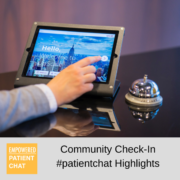Claiming the Number One Spot
Assimilation can sometimes take years to complete. Or, it can be a slow imperceptible change. It can happen and you may not be aware until after some time has passed. For others, assimilation can be a brutal quick mind-numbing takeover. What am I speaking of? It’s the mental and emotional takeover of being seen as a person with a name to a patient with a date of birth, social security number, and insurance card.
From the initial time you get your cancer diagnosis, you’re thrust into a complex healthcare system and suddenly you find yourself trying to maintain and keep your identity as a mother, father, sister, brother, son, or daughter, husband or wife. Soon, you’re running from doctor appointment to doctor appointment. Your sense of choice and control over your time and understanding your body is now unrecognizable to yourself. Eventually, you’re a patient. It’s scary how quickly your mindset changes and you find yourself feeling more like a victim. Understandable when you’re over your head all consumed in perhaps the battle for your life. Instead of assimilating, perhaps transitioning is a better term. It is difficult, but necessary, however, not to the degree you may think. Just because you are now ill, it doesn’t mean you have to just sit back and let the doctor make all the decisions and you just follow. You have to be an active participant in your care, every day, all the time! Traditionally we have always felt that doctors know everything and they will always do what’s in our best interest, all of the time. Not so! I had to remember when my husband was in treatment for myeloma, no two patients are the same, and no one doctor knows everything. There’s a reason it’s called “the practice of medicine.” It’s time to look at yourself not as a patient but as a person with a disease. You can still have control over your life and steer the ship.
This is a short fact sheet on self-empowerment. Refer to it over and over to remind yourself how to manage your treatment plan with your healthcare team. And, use it to expand your treatment team.
First:
Anytime you are in your doctor’s office, you are the most important person in the room. It’s all about you. Make sure the focus is on you and that you are giving your treatment team everything about your health, even minor changes as they may be important. Ask about the treatment, how it has affected other people and how it can affect you. What are all of your options? And, also equally important, what is this going to cost?
Second:
Ask over and over until you understand. Whether it’s about your health or the cost of your treatment plan, you need to be in the driver’s seat. You need to be able to plan not just for next week but for the rest of your life. Don’t be afraid to ask and get answers. Be respectful of your doctor’s time. Perhaps call in and make your doctor aware of your need for a few extra minutes to go over your questions or concerns or ask if you can send these questions ahead of your appointment so they can be prepared. Be aware that the financial questions may be sent to a social worker or someone else. On your request ask that they identify that person. That way you know who to go to for that information in the future. Or, request a few additional minutes to your appointment to have your concerns addressed. The point is, make sure you ask about all the concerns you may have regarding your treatment and its costs.
If you have problems asking questions there are people who can help you who can advocate on your behalf when you can’t. In addition to discovering or acquiring the skills you need to become an effective self-advocate, you need to be empowered to believe that your voice can and should be heard. Unfortunately, many older people, my mother was one of those, who are less educated or come from lower socioeconomic groups—those who are timid or shy by nature—may find it difficult to question someone they perceive as authority figures who control their destiny. They may fear asking “dumb” questions, or may not even know the questions to ask, or alienating their doctors by questioning them. And, trust is critical to any good doctor-patient relationship. Patients want to believe in their doctors. If you find yourself not getting the attention you need or answers to your questions, or you’re getting push back from the doctor, it may be time to look for another doctor. It won’t be easy, but not doing so can have a huge negative impact on the quality of your care. This is advocating for yourself and it’s so empowering!
Third:
The more you know about your cancer, the more you can participate in your treatment. There are many ways to research your illness. There are cancer-specific non-profits that offer a wealth of information and cancer-specific support programs. You may have access to a medical library or don’t forget the wealth of information you can get from creditable websites online.
One of the most difficult areas of advocating for yourself may be regarding understanding the cost of your care and sharing with the doctor before it’s too late how you don’t know how or if you can afford the care that is necessary. Financial toxicity adds so much stress which interferes with your health outcomes. And, unfortunately, the COVID-19 pandemic has only made things worse. The sooner you bring this subject up with your healthcare team the better off you are going to be. Our society, unfortunately, judges people on how big their house is, what kind of car they drive, and whose name is on clothing labels. Look around, you can have all the money in the world, but cancer/illness is one of the great equalizers. Your goal is to get the best care you can. There are many resources available to help you do that. From healthcare to financial assistance to empowerment guidance. Just ask!

Diahanna Vallentine, BCPA, Financial Empowerment Lead
In 2002 Diahanna and her husband received the news that her husband had MGUS, a precursor to Multiple Myeloma. Upon her husband death in 2013, Diahanna immediately decided to make it her mission to help patients and caregivers empower themselves to speak up and to position themselves as partners in their treatment. Diahanna became a Board-Certified Patient Advocate. She is currently the Financial Myeloma Coach for The Myeloma Crowd Foundation.










